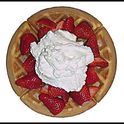I put too much salt in my green chili chicken and beans. Is there a solution?
13 Comments
nicole 3.April 8, 2013
My green chili came out to salty, i just made it a double batch and will can the rest of it tomorrow so i have extra for a rainy day.
GIOVANNI50February 2, 2013
The trick is to put in diced potatoes. The bigger the surface area the more salt absorption occurs
The potato must be starchy ( Idaho) and low in salt ( red new potatoes?) but do make small dices not large potatoes.
The potato must be starchy ( Idaho) and low in salt ( red new potatoes?) but do make small dices not large potatoes.
ChefOnoJanuary 31, 2013
I think the reason this myth is so prevalent is we all know potatoes (and beans for that matter) require a good deal of salt so it seems intuitive that they'd absorb it -- as indeed they do. It's just that they also absorb water at the same time so the ratio of salt to cooking liquid remains the same.
ChefOnoJanuary 31, 2013
Apparently the link I posted above doesn't work anymore. Here is Wolke on the subject and his proof:
http://books.google.com/books?id=8Lyrh2JXWuoC&pg=PA58
ChefOnoJanuary 31, 2013
[Sigh…] Extra beans won't do anything more than a potato (which is exactly nothing). And canned beans would be adding salt! A spoonful of sugar may help the medicine go down but there's no analogue for salt.
bugbittenJanuary 31, 2013
I'm probably too late, but I'd try adding more beans, even canned beans to the pot. Then before you serve, take out the extra beans. I was once successful in counteracting a bitter flavor from a shrimp stock by judiciously adding sweet, sour, salty and peppery flavors. But you're on your own, as I was. Do you have "bitters" on hand? Good luck!
ChefOnoJanuary 30, 2013
But I guess that doesn't directly answer your question. The only thing you can do is dilute the mixture down with something that doesn't have salt in it.
ChefOnoJanuary 30, 2013
I know a lot of people believe it but it's a culinary myth that a potato will absorb excess salt. Robert Wolke, professor emeritus of chemistry at the University of Pittsburgh, author of What Einstein Told His Cook, explains (edited for clarity):
Potatoes will soak up salty water but they don't selectively extract salt out of the water. Would you be surprised if a sponge placed in salt water came out tasting salty? Of course not. The concentration of salt in the water -- the amount of salt per quart -- is not affected.
http://www.washingtonpost...
cratecookingJanuary 30, 2013
I've heard, but never tried, that if you put a piece of peeled, raw potato in a salty liquid that it will help to absorb some of the sodium. Give it a shot and let us know how it works out!!
Showing 13 out of 13 Comments
Recommended by Food52
Popular on Food52
Continue After Advertisement


